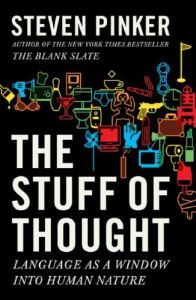Join getAbstract to access the summary!

Join getAbstract to access the summary!
Steven Pinker
The Stuff of Thought
Language as a Window into Human Nature
Viking, 2007
What's inside?
Nothing is ever “just semantics.” For humans, language is the way to apprehend reality. Or is it?
Recommendation
Steven Pinker’s enthusiasm about language comes through everywhere in this book – which is a good thing, because the subject matter itself is dense and complex. This combination results in a curious reading experience: Pinker’s lively style, many anecdotes and extreme lucidity pull you forward in the text, but the difficulty of the questions he raises could stump you for some time. He explores many linguistic theories in such depth that readers without a particular interest in the field may, frankly, get lost or find the book too abstract, despite Pinker’s numerous attempts to ground his discussions in reality. Therefore, while this is a fine book, getAbstract recommends it primarily to patient readers who have a strong interest in language and philosophy. Bring along an open mind and a sense of humor, since Pinker explores language practices – such as obscenities and insults – that may provoke emotional responses.
Summary
About the Author
Steven Pinker teaches psychology at Harvard, and is the author of The Language Instinct, How the Mind Works and The Blank Slate, a Pulitzer Prize finalist.






















Comment on this summary